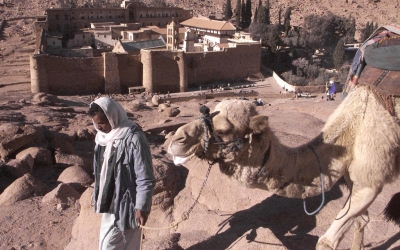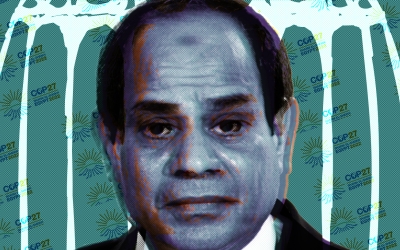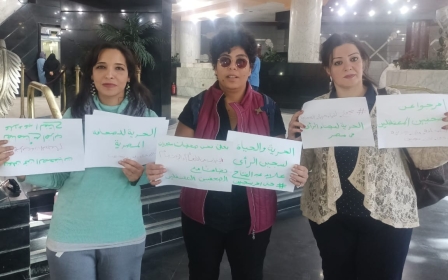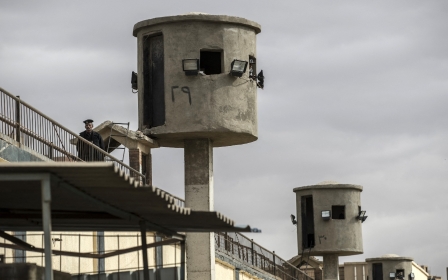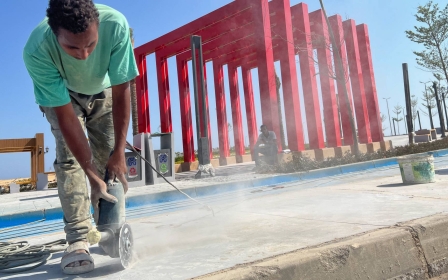Cop27: Surveillance and fear in Sharm el-Sheikh as Egypt clamps down on activists
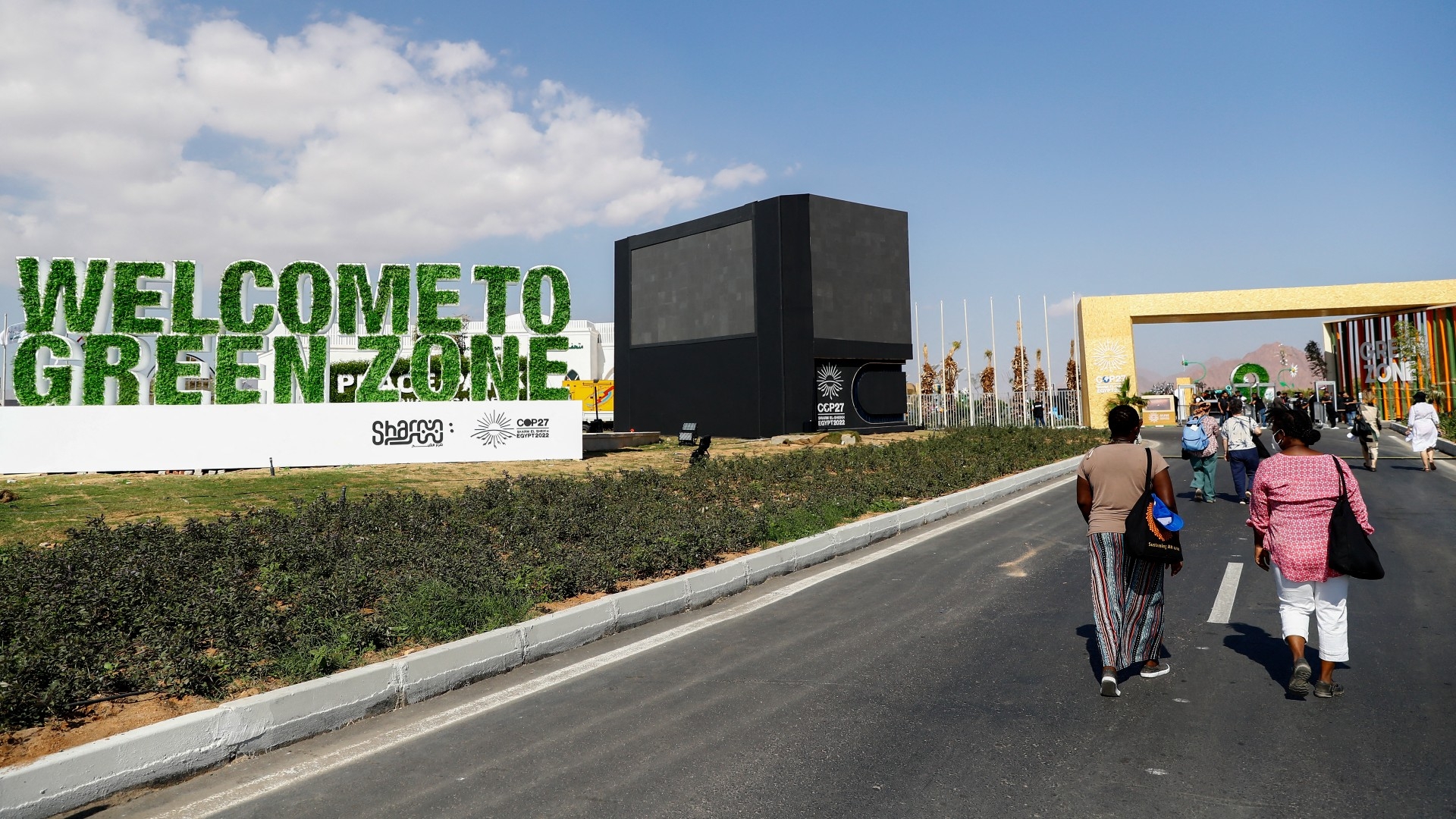
When Makarios Lahzy received a call from Egypt's dreaded National Security Agency (NSA), he immediately feared the worst.
The human rights lawyer had recently hosted Ajit Rajagopal, an architect and environmental activist from India, who was planning to walk 260km from Cairo to Sharm el-Sheikh ahead of Cop27 to highlight the challenges that climate change presents.
'Everything is being recorded and monitored, and connected to an interior ministry that we know are involved in crimes against humanity'
- Amr Magdi, Human rights researcher
But instead of being greeted with Rajagopal's progress, Lahzy was told that the activist had been detained shortly after he started his journey and that he should come and collect him.
Rushing to one of the hundreds of makeshift checkpoints erected in the run-up to the UN Climate Change Conference, known as Cop27, Lahzy was met by security officials who confiscated his phone and whisked him away to a local police station.
"They asked me, what do you do professionally, and what's your relation to this environmental activist?" Lahzy told Middle East Eye.
Rajagopal had been holding a banner that read "March For Our Planet", in reference to a caravan-foot, march style mobilisation that set off within Africa and spread globally.
After being treated like "criminals" for more than 24 hours, the pair were finally released, Lahzy said.
Critics of the Egyptian government say such arrests are not isolated events, but part of a pattern of ratcheting security and surveillance during Cop27.
Already inaccessible to people like Rajagopal, the climate change summit is taking place in a fortressed Red Sea resort billed to attendees as a glitzy tourist attraction.
It's a perfectly orchestrated piece of theatre involving meticulous set dressing. Tents housing people whose homes had been flattened during military crackdowns as part of Operation Sinai in 2017, have been shifted to another location, far from the resort.
The cost, and the labyrinthine process of registering for attendance, present enormous barriers to most Egyptian activists and those from the global south.
For activists travelling from abroad, fresh barriers have been erected through changes to visa applications which can now only be done in person.
"There's chaos at the visa office, they make people queue for (up to) five hours," UK-based climate activist Scarlett Westbrook told MEE.
"Lots of people are travelling down from Scotland and it’s becoming really expensive and bureaucratic."
According to Westbrook, youth activists have reported that they have received notifications that their accommodation has been cancelled two weeks ahead of the conference.
"The nature of Cop means if you're not part of an NGO [non-governmental organisation], you're more vulnerable because you don’t have an institution beyond you. They [Egyptian authorities] are abusing that."
'Dystopian and bizarre'
The conference's exclusivity is guarded by heightened surveillance. Routes are now dotted with checkpoints where phone checks are carried out. While they appear scattergun, they're carefully targeted.
"We are now starting to get reports about who is allowed to pass the checkpoints in Sinai," human rights activist, Samar Elhussieny told MEE.
"There is now a kind of database for people with particular backgrounds."
Within Sharm el-Sheikh's walls, a tightening network of surveillance technology will monitor the movements of attendees.
In an interview with a local TV channel, Major General Khaled Fouda boasted that cameras would be installed in 500 taxis hired to transport attendees during the conference and the footage would then be monitored by a "security observatory".
The interview itself was live streamed from one of the taxis which was being driven by the TV host.
"It was extremely dystopian and bizarre, showing… what it means to be inside the taxi," human rights researcher, Amr Magdi told MEE.
"Everything is being recorded and monitored, and connected to an interior ministry that we know are involved in crimes against humanity."
In the interview, Fouda revealed that the cameras were imported by Arab International Optronics, a company that is 51 percent military owned, with the remaining 49 percent owned by the French company Thales.
"The French government and defence industry are enabling repression in Egypt," Magdi said.
'This has been marketed as the African Cop. But Sharm el-Sheikh is as far away from Africa as you can get'
- Jonathan Neal, climate activist
Egypt has also received $6.2m in support from Denmark and Switzerland for its Cop27 presidency. For Magdi, the lack of transparency around the administration of this money raises serious questions about Europe’s collusion with the Egyptian state's surveillance of civilians.
"The question is, how do you monitor how this money is being spent? So you give six million to Egypt to help host Cop and maybe use two [million] of these six million dollars to justify the security cameras," he said.
Attendees are also required to download an official Cop27 app that requests private information from the user and is able to access their phone camera, microphone, Bluetooth and location data. "The government can definitely use it, if they want... to spy on people." Magdi added.
"I'm not saying they necessarily created the app to do that. But it has all the potential and technology needed to do that."
A mounting list of activists and journalists who disappeared after being stopped at checkpoints or removed from their homes is being pieced together by Egyptian NGOs.
A panel of independent experts known as Special Rapporteurs said last month that "arrests and detention, NGO asset freezes and dissolutions and travel restrictions against human rights defenders … created a climate of fear for Egyptian civil society organisations to engage visibly at the Cop27."
As of 1 November, 150 people are being held in detention facilities under charges relating to misusing social media and joining a terrorist group.
Intensifying surveillance and climbing detention figures come amid renewed calls on social media for protests on 11 November against the spiralling cost of living crisis.
"I think the timing is very good. Because the ability of the Egyptian government to crack down and do the same wave of arrests, like in 2019, is very limited because of the international attention to what's happening in Egypt right now," Elhussieny said.
Last year, similar calls for protests failed to garner much attention. But Elhussieny thinks that the combination of deteriorating living standards and the international scrutiny arising from Cop could embolden people to take to the streets.
"I participated in two revolutions. So I'm very sceptical about any expectations, or even the consequences of any big protests. What I'm sure of [is that] there will be protests," she added.
No more blah, blah, blah
Some activists have suggested that increased surveillance amounts to a clear reason why Cop27 shouldn't have taken place in Egypt.
Last week, 13 Nobel literature laureates wrote to world leaders urging them to discuss the plight of political detainees in Egypt ahead of the climate summit. The letter was organised by the publisher of Alaa Abd el-Fattah, a British-Egyptian writer imprisoned in Egypt.
'Reparations sound like a radical project. Buried in it, though, is the idea that we cannot and we will not stop climate change, that we're not going to try'
- Jonathan Neal, climate activist
The intervention came just days after Swedish environmental activist Greta Thunberg announced she would not be attending Cop27 due to human rights abuses in the host country.
On Monday, UN chief Antonio Guterres warned world leaders gathered at the summit that humanity faced a stark choice between working together or "collective suicide" in the battle against global warming.
"Humanity has a choice: cooperate or perish," Guterres said.
Jonathan Neal, a climate activist, told MEE that despite the warnings the event was going to be a "complete failure".
"This has been marketed as the African Cop," Neal said. "But Sharm el-Sheikh is as far away from Africa as you can get."
One of the topics that is set to dominate the Cop27 talks is reparations, sometimes referred to as "loss and damage" payments.
For Neal, the focus of reparation payments diverts serious efforts from averting climate disaster in the global south.
"This sounds like a radical project. Buried in it, though, is the idea that we cannot and we will not stop climate change, that we're not going to try," Neal said.
Egypt's positioning of itself as the "voice of the global south" and its demand for reparations, while marshalling all its resources to stifle the voices of Egyptian activists, also raises serious questions about the legitimacy of these payments.
“A significant amount of that money will almost certainly be paid to NGOs. Where the professionally educated people who work for the NGOs are making five times as much as the man who drives the Land Rover. And the white international staff are making 10 times as much as the professionally educated local staff. This is about helping the people who work for the NGOs not about helping the people,” Neal told MEE.
A year ago, outside the UN Climate Conference in 2021, Greta Thunberg vented her rage "No more blah blah blah, no more whatever the f*** they’re doing inside there."
For Neal, this frustration is symptomatic of "a deep feeling of rage" fomenting in the environmental movement.
"Traditionally 30,000 people attend Cop. It's much bigger than a government-controlled event, they can't crack the whip in the same way.
"If I were thinking on behalf of the Egyptian dictatorship, I would be worried about that."
MEE reached out to the Egyptian embassy in London and the French company Thales for comment, but did not receive a response by time of publication.
Middle East Eye propose une couverture et une analyse indépendantes et incomparables du Moyen-Orient, de l’Afrique du Nord et d’autres régions du monde. Pour en savoir plus sur la reprise de ce contenu et les frais qui s’appliquent, veuillez remplir ce formulaire [en anglais]. Pour en savoir plus sur MEE, cliquez ici [en anglais].


